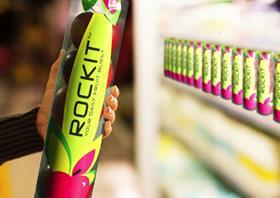
It depends how big your mouth is but most apples take more than just four bites to get through. The New Zealand variety Rockit is an on-the-go snack rather than a lunch box filler.
In October, north German growing and marketing organisation Elbe-Obst will begin sales of the variety, which is red, very sweet and one and half times the size of a golf ball.
There are already licensed growers in the UK, USA, Australia, Belgium, Italy and France, among other countries, but this season will be the first that the variety is sold in Germany. The variety, which was developed by Havelock North Fruit Company in New Zealand is alsoshipped to and sold in China, Taiwan and other Asian countries.
Elbe-Obst’s managing director Frank Döscher is hopeful about the variety’s prospects in Germany, but emphasised that miniature snacking apples will be a new concept for Germany.
The variety is so small that a decision was needed from the United Nations before the New Zealand-based head licensee Havelock North could call its miniature apples, apples. The variety was too small to fit the UN’s minimum size grade.
Döscher said: “Let’s see what happens. It’s a totally new product here, but I’m hopeful. I’m not afraid of new concepts.”
He added: “Our performance this year will determine what we plant next year. First of all we need to test the market and the next step will be to plant more trees with bigger volumes.”
Unlike licensees in China and the US, Elbe-Obst is a licensed grower of the variety, rather than just a licensed marketer. The organisation’s growers are cultivating 50,000 Rockit trees in the Niederelbe region this current season. Next season there are preliminary plans to plant 20,000 more.
When the crop is ready to pick in six to eight weeks’ time, the plan is to begin sales in small city-based retailers and service stations, where the company hopes it can position the apple as an attractive on-the-go snacking option.
“It’s perfect when you go to the petrol station and decide between junk food and health,” said Döscher. “We’re not so interested in the big retailers for now,” he added.
Döscher suggested that each apple container might cost “about the same price as two Mars bars”, but he said the retail price was yet to be fixed.
Beyond the miniature size, the variety’s main marketing feature is the tall plastic container they are sold in, which resembles a tennis ball tube. The containers come in different sizes and are stacked from one to five apples high. Elbe-Obst is looking at sending them to retail in packs of 3, 4 or 5.
Flavour and sweetness will also be selling points, according to Elbe-Obst’s managing director. He said: “Rockit apples are very sweet, very tasty, very crunchy.”



